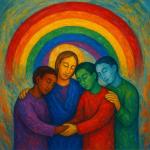In the “High Priestly Prayer”, Jesus passionately pleads for unity among his believers, a sentiment that strongly resonates today. With themes of Trinity, Divine nature and hints about the nature of who Jesus was, we end up with a Trinitarian prayer that reveals God’s desire to draw humanity into the very heart of God’s divine communion. The unity among believers is a direct reflection of the unity within the Godhead, powered by the love that flows between the Father, Son, and Holy Spirit, and intended as a powerful witness to the world.
The Nature of Jesus
From a teacher/parent/pastor/leadership perspective, I can really appreciate what Jesus is doing in this passage. In the other Gospels this prayer comes after dinner, right before he is arrested. Jesus, considering his time with his diciples and anticipating the hardships they are going to face, challenges them with a passionate prayer that reminds them of the Trinitarian action of God and the need for unity.
This passage highlights the Jewish heritage of Jesus. Previously, I have discussed the concept of Tikkun Olam (repairing the world). Here, it is important to acknowledge that Jesus was indeed Jewish, and the principle of Tikkun Olam underscores the Jewish imperative to perceive one’s life as part of a greater purpose, thereby finding meaning in one’s actions.
In later texts, such as those of Paul, we observe the influence of Jesus’s teachings on Tikkun Olam. For instance, Paul emphasizes “unifying love in the body of Christ,” which entails a committed effort to perform good deeds for the Christian community, irrespective of personal feelings (Galatians 6:10). Paul further elaborates that Christian unity extends beyond mere sacrifice for those one may not favor; it also involves affectionate love. He advocates for a deep sense of endearment towards fellow believers in Christ.
Paul’s exhortations include: “Love one another with brotherly affection” (Romans 12:10), “Having purified your souls by your obedience to the truth for a sincere brotherly love, love one another earnestly from a pure heart” (1 Peter 1:22), and “All of you, have sympathy, brotherly love, a tender heart, and a humble mind” (1 Peter 3:8).
The nature of Jesus then is one of compassion and empathy, being mindful of his community as well as of himself. If we explore other passages in the New Testament, we will see multiple examples of this. To be Christian, in the image of Jesus, with Jesus as our role model, is to embody this ‘Jesus nature’.
Power of the Trinity
At the core of my spiritual study is John Wesley. Among the various Reformers and thinkers from the 18th century that I have studied, it is Wesley who consistently resonates with me. His preaching, which challenged and shaped society, particularly influenced my perspective during my college years. When examining Wesley’s views on the nature of the Trinity as presented in scripture, one can observe his strong commitment to Trinitarian doctrine and his thorough engagement with these themes.
Four themes pop out after looking through Wesley’s writings on this passage:
Christian Perfection and Love: According to Wesley, the unity described in John 17 is an essential aspect of “Christian perfection” or “holiness of heart and life.” This concept involves being perfected in love (note that this is a process of becoming) – encompassing both love for God and love for one another, which originates from divine love. This unity of love signifies a Spirit-filled life.
Social Holiness: Wesley’s focus on “social holiness” would interpret the unity in Christ as extending beyond individual devotion to an active, loving community. The church, as a united body, aims to demonstrate God’s love and justice to the world, serving as a visible sign of God’s kindom.
Witness and Evangelism: The missional directive of John 17:21 (“so that the world may believe”) aligned with Wesley’s evangelical enthusiasm. For him, the unity of believers was not the ultimate goal (Conversion is a personal choice, but it is our responsibility to tell the good news) but rather a powerful method for attracting others to Christ. He held the view that when Christians genuinely loved and lived in unity, it would prompt the world to acknowledge the divine truth of the Gospel.
Spiritual Experience: Wesley emphasized that this unity is not purely organizational or intellectual, but a spiritual experience facilitated by the indwelling Holy Spirit, bringing believers into living communion with the Father and the Son. It represents a tangible, experienced presence of God’s love within the community.
Divine Union
Unity with each other is unity with God. Whether we look at Jesus’ orientation from his Jewish faith or from the writings about the Acts 2 church to the call in Psalm 82, we are called as a people to be unified in Christ. Galatians challenges us to erase the lines that divide us. This unity, however, is not a passive ideal but a transformative call that requires active participation and intentionality from believers. It involves striving for mutual understanding, cultivating a spirit of forgiveness, and embodying the selfless love exemplified in Christ. Through this divine union, the boundaries that separate individuals—be they cultural, social, or ideological—are dissolved, allowing the Christian community to reflect the sacred harmony of the Trinity. This unified body, empowered by the Spirit, serves not only as a beacon of hope but also as a living testimony to the world, demonstrating the redemptive and unifying power of God’s love.
Our Christian faith, our country’s morals continue to suffer an identity crisis. Christ poured himself out so we could all be whole, not divided. We must take up the cross with Christ and bear witness to the poor, to the widowed, the hungry, to those we deem different. We must share the unifying love of God with others.













